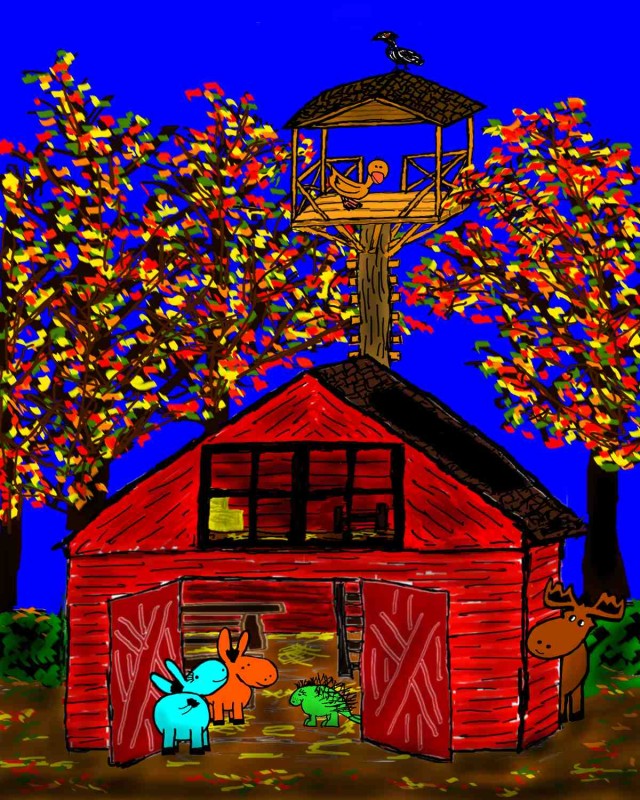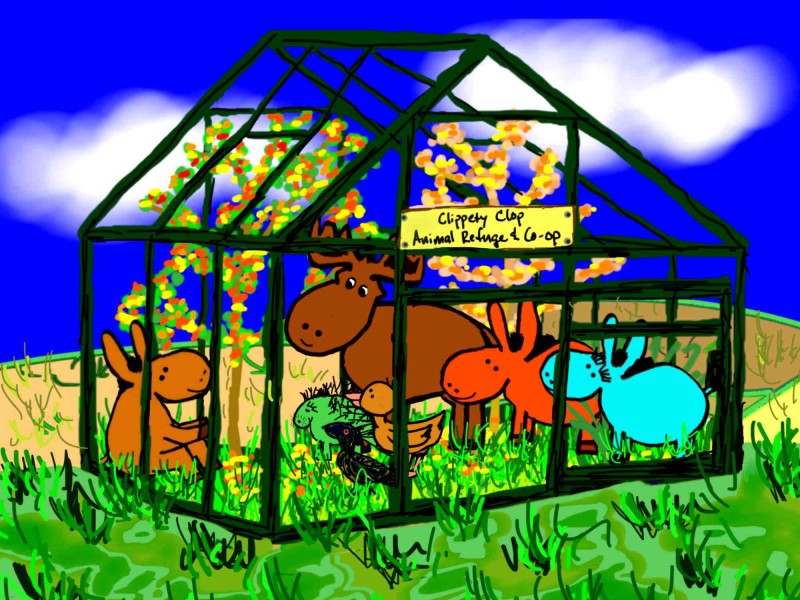Do you think we’re early? said Morton.
I don’t want to appear anxious, said Emma Lou.
Neither do I, said Chelsea.
How long should we wait? said Morton.
Until it’s time, said Emma Lou.
How will we know? said Morton.
They’ll tell us, said Emma Lou.
What if they don’t? said Morton.
Then we’ll never know, said Chelsea.
They’ll tell us, said Emma Lou, if they want us to know.
And if they don’t? said Morton.
Then they won’t tell us, said Emma Lou.
That makes sense, said Chelsea.
Where are the others? said Morton.
They’re waiting for us to decide, said Chelsea.
They don’t want to appear anxious, said Emma Lou.
What’s wrong with appearing anxious? said Morton.
It makes you look greedy, said Emma Lou.
Even if you’re willing to share? said Morton.
Maybe they want us to wait, said Chelsea.
Why? said Morton.
Because anticipation increases desire, said Emma Lou.
Yes, said Chelsea, like in the Kama Sutra.
The Kama Sutra? said Morton.
The Kama Sutra, said Chelsea, is one of the books on our reading list.
The one the moose keeps hogging? said Morton.
Yes, said Chelsea, but I managed to sneak a peak.
What does it say? said Morton.
It says that withholding pleasure increases desire, and increasing desire increases pleasure.
What if you don’t get what you desire? said Morton.
Then you still get the pleasure of anticipating, said Chelsea.
The pleasure of anticipating? said Morton.
Yes, said Chelsea, like when you spend the winter anticipating the spring fashions, and when the fashions come out, you’re a little disappointed, but at least you had the pleasure of anticipating them.
That happens for me, said Emma Lou, every season of the year.
But sometimes when you get something, said Morton, it’s as good as what you had hoped for.
That’s true, said Chelsea, but getting it doesn’t diminish the pleasure you got from anticipating it.
It teaches you, said Emma Lou, to enjoy the journey and not focus on the destination.
The destination? said Morton.
The object of desire, said Emma Lou.
We’ve waited long enough, said Morton.
You may be right, said Emma Lou.
I wonder if the others are enjoying the wait? said Chelsea.
Birds can be very patient, said Emma Lou.
That’s true, said Morton, I watched Frank sit on a fence for five hours yesterday.
You watched him for five hours? said Chelsea.
Yes, said Morton.
And you didn’t get impatient? said Chelsea.
No, said Morton, I didn’t want to eat him.
So you’re only impatient, said Emma Lou, with things you want to consume?
Yes, said Morton.
What if you’re not hungry? said Emma Lou.
There are some things I want to consume, said Morton, whether I’m hungry or not.
That’s not very healthy, said Emma Lou.
I know, said Morton.
Do you smell that? said Chelsea.
Yes, said Emma Lou, I do.
It must be time, said Chelsea.
Yes, said Emma Lou, it must be time.
Really? said Morton, I was just starting to enjoy the anticipation.
Tag: frank the crow
“Weohryant University” (XVI) – When 101
Today’s question, said Pablo, is: “When is it too late?”
Too late for what? said Morton.
I didn’t do it, said Emma Lou.
Too late for planting? said Frank.
“Lateness,” said Glouster, is “arriving or remaining after the due, usual, or proper time.”
The proper time? said Chelsea. Who decides what is the proper time?
Your boss does, said Frank.
Or your teacher, said Glouster.
Or whoever makes the rules, said Morton.
Whoever has the power, said Emma Lou.
Michel Foucault, said Glouster, said: “The strategic adversary is fascism… the fascism in us all, in our heads and in our everyday behavior, the fascism that causes us to love power, to desire the very thing that dominates us.
Am I a fascist? said Chelsea.
I don’t think you’re a fascist, said Morton.
What’s a fascist? said Frank.
“Fascism,” said Glouster, is “a political philosophy, movement, or regime that exalts nation and often race above the individual and stands for a central autocratic government headed by a dictatorial leader, severe economic and social regimentation, and forcible suppression of opposition.”
That doesn’t sound like me, said Chelsea.
It can also mean, said Glouster, “a tendency toward or actual exercise of strong autocratic or dictatorial control.”
Dictatorial control? said Morton.
A dictator, said Glouster, is “someone granted absolute power, often ruling oppressively.”
Do I have absolute power? said Chelsea.
Foucault goes on to say, said Glouster, “It is my hypothesis that the individual is not a pre-given entity which is seized upon by the exercise of power. The individual, with his identity and characteristics, is the product of a relation of power exercised over bodies, multiplicities, movements, desires, forces.”
Seized on by the exercise of power? said Frank.
Does that mean, said Chelsea, that I’m a victim.
Both a victim, said Emma Lou, and a dictator.
Foucault adds, said Glouster, that “there is no power relation without the correlative constitution of a field of knowledge, nor any knowledge that does not presuppose and constitute at the same time power relations.”
Isn’t that a vicious circle? said Chelsea.
Yes, said Glouster.
How did we get caught, said Frank, in this vicious circle?
We were talking, said Emma Lou, about who decides what is too late and what is not too late.
Sometimes, said Frank, nature decides what is too late.
Yes, said Morton, like when it’s too late to plant pumpkins in order to have a good harvest in the fall.
Does that mean, said Chelsea, that nature is a fascist?
A fascist, said Emma Lou, that desires to be exploited by itself.
But I am a part of nature, said Morton. Does that mean I’m constantly exploiting myself?
Yes, said Emma Lou.
So if I grow a pumpkin, said Morton, then make a pumpkin pie, then eat it, I’m exploiting myself?
Yes, said Emma Lou.
In that case, said Morton, I should try to exploit myself more often.
When is it too late, said Chelsea, to plant pumpkins for a good harvest?
I don’t know, said Morton, I’ve never planted a pumpkin.
You haven’t? said Chelsea.
No, said Morton, I’ve always exploited the pumpkin someone else planted.
That’s shameful, said Chelsea.
Is it? said Morton.
What if, said Emma Lou, the person who planted the pumpkin derived pleasure from Morton’s exploitation of the pumpkin?
You mean, said Frank, the pleasure one gets from sharing with someone else?
Exactly, said Emma Lou.
That’s a good question, said Chelsea.
What would Foucault say? said Frank.
I’m not sure, said Glouster, I suppose he would say that the act of sharing is an act of exploitation, a disguised power-play designed to manipulate the recipient into a position of gratitude and subservience.
I think, said Chelsea, the world would be a better place if more of us went around exploiting each other by sharing.

